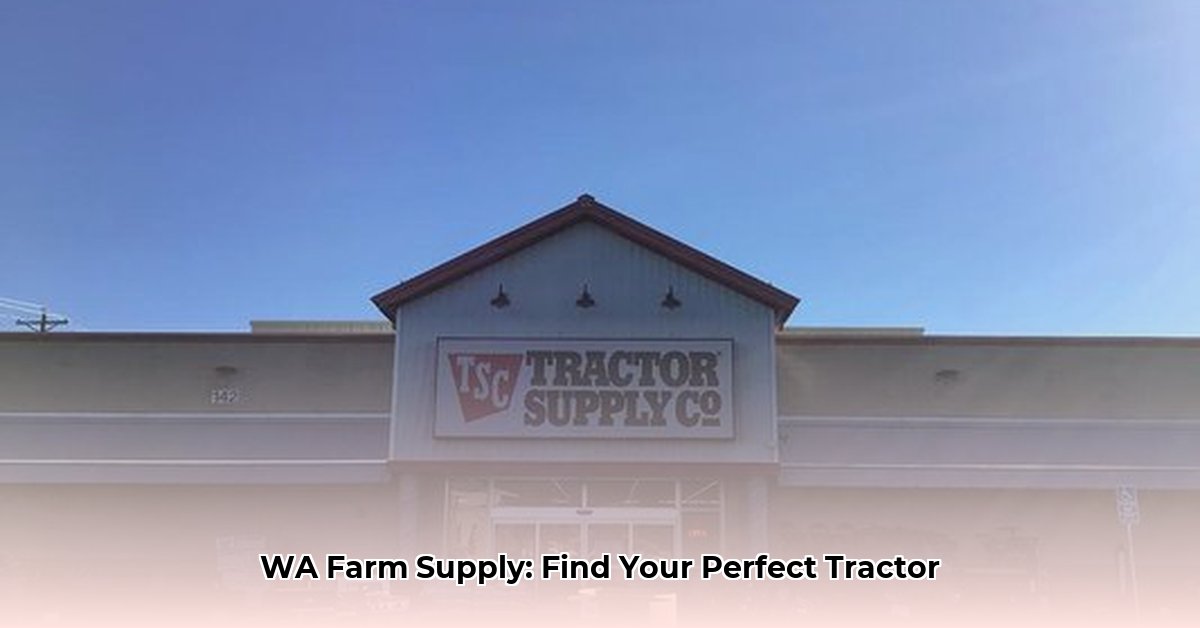
Shelton Tractor Supply: A Washington State Farm Supply Deep Dive
Tractor Supply Company (TSC) operates a significant retail presence across the United States, with its Shelton, Washington store serving as a crucial hub for farmers and rural residents in Mason County and surrounding areas. This analysis examines the Shelton store's role within the broader Washington agricultural landscape, exploring its geographic reach, operational aspects, and potential for future growth. Crucially, it highlights the need for further research to create a complete picture of TSC’s impact. For comparison, see this example of another TSC location: Moorpark TSC.
Geographic Positioning: Shelton TSC and its Regional Influence
The Shelton TSC store is strategically located in Mason County, WA. Its service area likely extends beyond Shelton's city limits, encompassing neighboring towns like Hoodsport, Union, and Grapeview, potentially even reaching Olympia. This suggests TSC caters to a dispersed rural market, benefiting from access to a wider customer base than just Shelton residents. However, the precise extent of its reach remains undefined due to a lack of readily available data on customer origins and purchasing habits. A comprehensive map of all Washington state TSC locations is needed to fully understand TSC's market penetration strategy within the state. This analysis would greatly enhance our understanding of TSC's geographic footprint and its influence on regional agriculture.
Operational Insights: Data Gaps and Analysis Limitations
While basic operational details such as the Shelton store's address and hours of operation are publicly accessible, crucial data regarding sales figures, market share, profitability, and sustainability practices remain unavailable. This data deficiency significantly limits a thorough assessment of the store's performance and its impact on the local economy. Access to sales data would illuminate seasonal sales fluctuations, competitive pricing strategies, and customer behavior patterns, ultimately creating a more complete understanding of the Shelton store's success. Detailed information on product sourcing and sustainability practices would be crucial to evaluate the store’s commitment to environmentally conscious operations.
Actionable Intelligence: Strategies for Growth and Improvement
Despite data limitations, several actionable insights can be gleaned. A robust understanding of TSC's role requires collaborative efforts from various stakeholders:
Tractor Supply Company: Invest in comprehensive market research across Washington State to identify underserved areas and optimize existing store operations. Analyze existing Shelton sales data to identify sales trends and opportunities for improvement. Long-term strategies should include strategic expansion across Washington, potentially via new store openings or acquisitions, supplemented by strengthening relationships with local farmers through workshops and collaborative initiatives that are explicitly focused on sustainability and eco-friendly supply chains.
Washington State Farmers: Utilize TSC effectively, comparing offerings with competing suppliers to ensure optimal value and product suitability. Actively participate in shaping TSC's product offerings by pushing for a wider selection of sustainable and eco-friendly products.
Local Communities: Support TSC's economic contributions and actively engage with community outreach programs. Monitor TSC's contribution to local employment and overall community development.
Environmental Organizations: Monitor TSC's commitment to sustainable sourcing and actively engage with their sustainability initiatives. Collaborate with TSC to promote environmentally sound farming practices and advocate for the expansion of eco-friendly products within their inventory. This collaboration is crucial for identifying and addressing potential environmental concerns associated with agricultural practices.
Conclusion: The Need for Further Research
This analysis provides an initial assessment of Shelton Tractor Supply's role in Washington's agricultural landscape. However, the limitations imposed by a lack of readily available data highlight the critical need for further research. A comprehensive study incorporating detailed sales data, a thorough statewide mapping of TSC's locations, competitive landscape analysis, and a sustainability assessment is urgently needed to create a truly robust and insightful understanding of TSC's influence on Washington's farming community and the environment.